
Symmetry-Basel
Scope & Guideline
Empowering researchers with open access to groundbreaking studies.
Introduction
Aims and Scopes
- Theoretical Foundations of Symmetry:
Exploration of mathematical symmetries, including group theory, Lie algebra, and symmetry operations in differential equations, providing foundational insights into the role of symmetry in various scientific contexts. - Applications of Symmetry in Physics:
Research that applies symmetry principles to physical systems, including quantum mechanics, general relativity, and condensed matter physics, highlighting the implications of symmetry for understanding fundamental forces and particles. - Symmetry in Engineering and Technology:
Investigations into how symmetry affects design and functionality in engineering applications, such as structural engineering, robotics, and materials science, emphasizing optimizations and innovations driven by symmetry considerations. - Symmetry in Biological and Environmental Sciences:
Studies that examine the role of symmetry in biological systems and ecological interactions, including topics such as evolutionary biology, ecology, and medical applications, particularly in understanding physical and functional asymmetries. - Computational Methods and Algorithms:
Development and application of computational techniques for symmetry analysis, including numerical simulations, machine learning algorithms, and optimization methods that leverage symmetry to enhance performance and accuracy.
Trending and Emerging
- Quantum Computing and Symmetry:
The intersection of quantum computing and symmetry has emerged as a significant area of research, focusing on how symmetry principles can enhance quantum algorithms and computational efficiency. - Symmetry in Machine Learning and AI:
There is a growing interest in applying symmetry concepts to improve machine learning models, particularly in areas such as data augmentation, feature extraction, and model robustness. - Symmetry in Environmental and Biological Systems:
Research exploring the implications of symmetry in ecological models, biological systems, and environmental sustainability is gaining traction, emphasizing the importance of symmetry in understanding complex interactions. - Advanced Computational Techniques for Symmetry Analysis:
The use of sophisticated computational methods, such as deep learning and advanced numerical simulations, to analyze and exploit symmetry in various applications is becoming increasingly prominent. - Interdisciplinary Applications of Symmetry:
A notable trend is the exploration of symmetry across disciplines, where researchers are integrating concepts from mathematics, physics, biology, and engineering to address complex real-world problems.
Declining or Waning
- Classical Symmetry in Historical Contexts:
Research that delves into classical interpretations and historical perspectives of symmetry has seen a decrease. As scientific inquiry becomes more application-driven, historical analyses may be overshadowed by contemporary applications. - Basic Symmetry in Pure Mathematics:
Topics centered solely on basic symmetry concepts without applications or interdisciplinary connections are observed to be less frequently published, as the journal shifts towards more integrative and applied approaches. - Traditional Approaches to Symmetry in Physics:
Conventional studies on symmetry in physics, particularly those that do not incorporate modern theoretical advancements or interdisciplinary methods, are diminishing as newer, more innovative frameworks gain traction. - Symmetry in Non-Scientific Disciplines:
Research focusing on symmetry in non-scientific contexts, such as art or philosophy, has declined in favor of more rigorous scientific applications and interdisciplinary studies that emphasize empirical findings. - Theoretical Symmetry without Computational Elements:
Theoretical discussions lacking computational or practical applications are becoming less common, reflecting a trend towards research that combines theory with computational or empirical methodologies.
Similar Journals
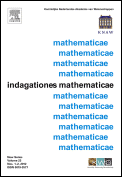
INDAGATIONES MATHEMATICAE-NEW SERIES
Fostering innovation in mathematical research and discovery.INDAGATIONES MATHEMATICAE-NEW SERIES is a distinguished academic journal specializing in the field of mathematics, with a focus on both theoretical and applied aspects of the discipline. Published by Elsevier, a leading publisher in the scientific community, this journal has established itself as a crucial platform for the dissemination of high-quality research. With an ISSN of 0019-3577 and an E-ISSN of 1872-6100, it operates out of the Netherlands and has been a vital resource for academics since its inception in 1969. Currently, it holds a Q2 ranking in the mathematics category, signifying its relevance and impact in the field, with a Scopus rank of #222 out of 399 in General Mathematics, placing it in the 44th percentile. Although it does not currently offer Open Access options, INDAGATIONES MATHEMATICAE-NEW SERIES is committed to contributing to the advancement of mathematics by publishing original research articles, reviews, and notes that enrich the academic community. Researchers, students, and professionals alike will find invaluable insights and developments within its pages, making it a cornerstone journal for those keen on exploring the complexities of mathematics.

International Journal of Mathematics and Physics
Charting New Territories in Mathematics and Physics ResearchThe International Journal of Mathematics and Physics, published by AL-FARABI KAZAKH NATIONAL UNIVERSITY, serves as a vital platform for scholars and researchers engaged in the fields of mathematics and physics. With an ISSN of 2218-7987 and E-ISSN 2409-5508, this journal has been committed to disseminating high-quality research since its inception in 2019, and will continue to do so until 2024. Although currently not an open access journal, it provides valuable insights into a diverse array of topics, receiving considerable attention within the academic community. The journal holds a Q4 ranking in categories such as Computer Science Applications, Miscellaneous Mathematics, and Miscellaneous Physics and Astronomy, highlighting its emerging role in these fields. With Scopus rankings placing it at the lower percentiles, the objective of the journal is to foster growth and offer a constructive forum for ideas that will drive innovative research and discussions. The International Journal of Mathematics and Physics is essential for anyone looking to explore the intersections of these disciplines and advance their knowledge through collaborative scholarship.

REVISTA MEXICANA DE FISICA
Pioneering Insights in Physics and Educational MethodologiesREVISTA MEXICANA DE FISICA is a prominent academic journal dedicated to advancing knowledge in the fields of Physics and Education. Published by the SOC MEXICANA FISICA, this journal plays a pivotal role in disseminating innovative research and educational methodologies from Mexico and beyond. With a publication history that spans from 1991 to 2024, it has established itself as an essential resource for researchers, professionals, and students who seek to deepen their understanding of general physics and astronomy. The journal is classified in the Q3 quartile in both education and physics & astronomy, showcasing its quality and relevance within the academic landscape. While the journal currently operates on a subscription basis, it provides a valuable platform for emerging voices and established scholars alike. By fostering a collaborative environment for scientific discourse, REVISTA MEXICANA DE FISICA continues to be an important channel for the ongoing evolution of scientific education and exploration in the physical sciences.

CANADIAN JOURNAL OF MATHEMATICS-JOURNAL CANADIEN DE MATHEMATIQUES
Elevating research standards in the world of mathematics.Canadian Journal of Mathematics - Journal Canadien de Mathématiques is a prestigious peer-reviewed journal published by Cambridge University Press, which aims to advance the field of mathematics through the dissemination of high-quality research articles. With its ISSN 0008-414X and E-ISSN 1496-4279, the journal plays a pivotal role in fostering mathematical research and collaboration. It has been recognized for its impactful contributions, currently holding a category quartile ranking of Q2 in Mathematics (miscellaneous) for 2023 and sits in the 66th percentile among its peers according to Scopus rankings. As the journal continues its convergence from its inception in 1994 through to 2024, it remains a vital resource for researchers, professionals, and students seeking to stay at the forefront of mathematical developments. The journal does not operate under an open access model, allowing for a curated collection of articles that adhere to rigorous academic standards.
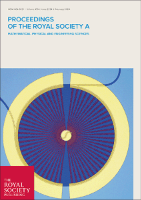
PROCEEDINGS OF THE ROYAL SOCIETY A-MATHEMATICAL PHYSICAL AND ENGINEERING SCIENCES
Elevating Knowledge Through Rigorous Scientific Exploration.PROCEEDINGS OF THE ROYAL SOCIETY A-MATHEMATICAL PHYSICAL AND ENGINEERING SCIENCES is a prestigious academic journal published by the Royal Society in the United Kingdom, dedicated to the dissemination of high-quality research in the fields of Mathematics, Engineering, and Physics. With an esteemed impact factor and ranked in the top quartiles (Q1) across various categories, this journal stands out as a leading source of innovative findings and critical discussions within the global scientific community. Researchers benefit from its comprehensive coverage that spans from theoretical explorations to practical applications, and the journal plays a crucial role in advancing knowledge and fostering interdisciplinary collaboration. Although it does not currently offer Open Access options, its influence is underscored by notable Scopus rankings, evidencing its significant contribution to the fields it represents. Located at 6-9 Carlton House Terrace, London SW1Y 5AG, England, the journal continues to be a cornerstone for scholars seeking to publish impactful research and stay informed on the latest advancements in science and engineering.

Annals of PDE
Connecting Global Scholars through Open Access ResearchThe Annals of PDE, published by SpringerNature, is a premier academic journal dedicated to the field of partial differential equations, encompassing areas such as Analysis, Applied Mathematics, Geometry and Topology, and Mathematical Physics. Since its inception in 2015, the journal has established itself as a vital resource for researchers and professionals seeking to disseminate cutting-edge findings in these rapidly evolving disciplines. With a remarkable Q1 ranking across multiple categories in 2023, including Mathematics and Physics and Astronomy, the Annals of PDE positions itself at the forefront of academic scholarship, as evidenced by its notable Scopus rankings, such as 7th percentile in Geometry and Topology. The journal offers a platform for open access to its articles, making it accessible to a global audience, and fostering collaborative advancements in the understanding and application of partial differential equations. Its contributions are invaluable for advancing theoretical and practical knowledge in mathematics and physics, making it an essential read for students, researchers, and professionals alike.
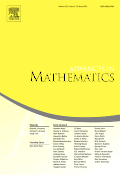
ADVANCES IN MATHEMATICS
Unveiling Cutting-Edge Discoveries in MathematicsADVANCES IN MATHEMATICS, published by Academic Press Inc. Elsevier Science, is a premier journal in the field of mathematics, with its ISSN 0001-8708 and E-ISSN 1090-2082. Renowned for its rigorous peer-reviewed research, this journal serves as a platform for disseminating cutting-edge advancements and innovative approaches across all branches of mathematics. With an impressive Q1 category ranking in Mathematics (miscellaneous) and a Scopus rank of 74/399 placing it in the 81st percentile, it is considered a vital resource for researchers and professionals seeking to stay abreast of emerging trends and developments. Although it is not currently an open access publication, ADVANCES IN MATHEMATICS remains committed to publishing high-quality articles that elevate the field and foster scholarly communication. Established in 1961 and continuously influential in advancing mathematical sciences, this journal is crucial for anyone deeply engaged in mathematical research.
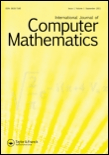
INTERNATIONAL JOURNAL OF COMPUTER MATHEMATICS
Fostering Insightful Research in Mathematical ComputingThe International Journal of Computer Mathematics, published by Taylor & Francis Ltd, stands as a prominent forum for the dissemination of novel research in the intersection of mathematics and computing. Established in 1964, this journal has evolved significantly, contributing to the field with robust methodologies and innovative applications. It holds notable rankings within Scopus, classified as Q2 in Applied Mathematics and Q3 in both Computational Theory and Mathematics and Computer Science Applications for 2023, highlighting its pivotal role in advancing academic discourse. Though it is not an open-access journal, its rigorous peer-review process ensures that published articles maintain the highest scholarly standards, making it a reliable source for cutting-edge research. Researchers, professionals, and students alike will find valuable insights and advancements that push the boundaries of mathematical applications in computing, solidifying its importance within the mathematical and computer science communities.

JOURNAL OF LIE THEORY
Bridging Theory and Application in Lie Theory.JOURNAL OF LIE THEORY, published by Heldermann Verlag, is a prominent academic journal that concentrates on theoretical advancements in the realm of Lie theory, encompassing Lie algebras, Lie groups, and their applications across various branches of mathematics. Since its inception, the journal has served as a vital platform for researchers to disseminate innovative findings, contributing significantly to the field's body of knowledge. With a commitment to high-quality scholarship, the journal ranks in the Q3 quartile for Algebra and Number Theory, indicating a respectable standing within its category. Although it is not an open-access journal, the JOURNAL OF LIE THEORY remains accessible to researchers and institutions with subscriptions, fostering collaboration and knowledge exchange among mathematicians. As it continues to publish valuable research from 1996 to 2024, this journal remains a crucial resource for those interested in the intricate relationships and structures defined by Lie theory, ensuring that both seasoned academics and budding scholars can explore and expand upon the discipline's foundational concepts.
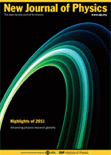
NEW JOURNAL OF PHYSICS
Connecting global minds through groundbreaking physics.NEW JOURNAL OF PHYSICS, published by IOP Publishing Ltd, is a prestigious open-access journal that has been at the forefront of the physics community since its inception in 1998. With an impact factor that places it in the Q1 category of Physics and Astronomy (miscellaneous) and a commendable ranking of #49 out of 243 in the general physics and astronomy category according to Scopus, this journal is recognized for its significant contribution to advancing research in the field. The journal caters to a broad scope of topics, providing a platform for the dissemination of cutting-edge research findings and innovative theoretical explorations. Operating from the United Kingdom, it offers a truly international perspective, making its contents accessible and impactful to a global audience. With robust open-access options, the NEW JOURNAL OF PHYSICS ensures that research findings are freely available, promoting collaboration and knowledge sharing among researchers, professionals, and students alike. This commitment to accessibility, combined with its high-quality content, makes it an essential resource for anyone engaged in the physics community.